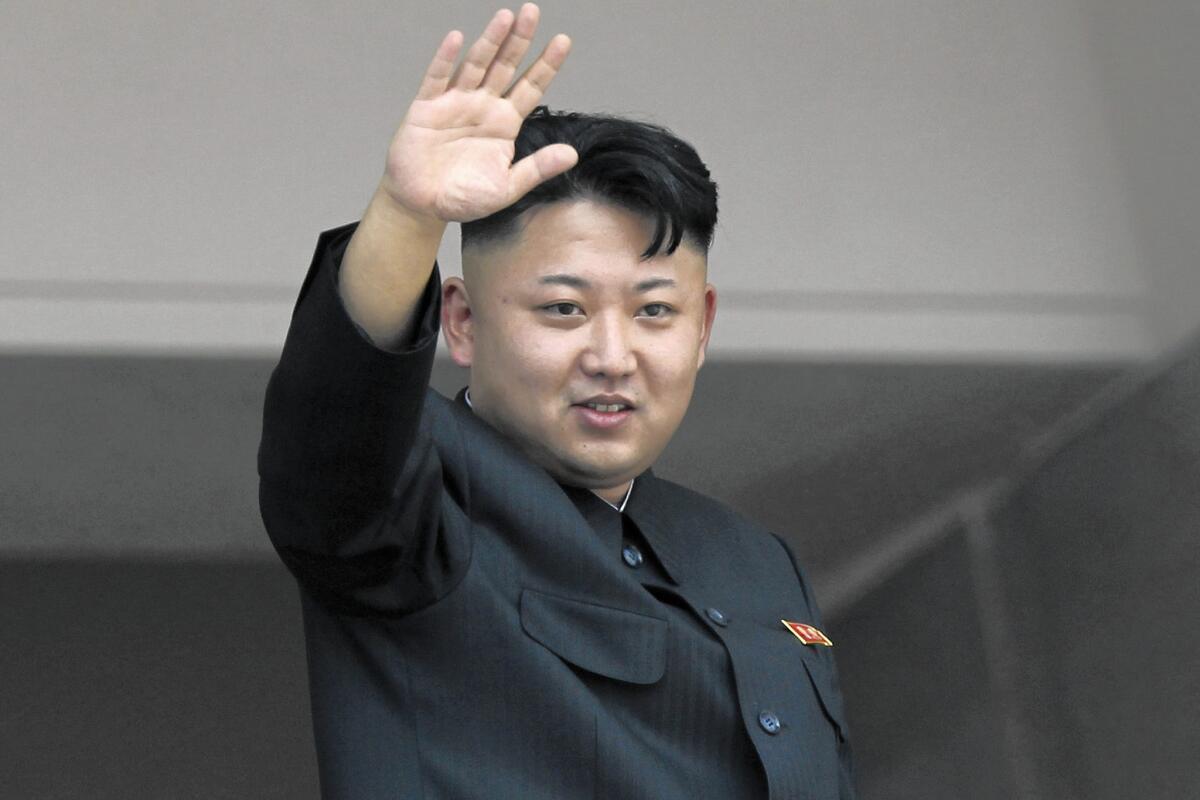Why South Korean filmmakers would never make movie like ‘The Interview’

- Share via
reporting from SEOUL — South Korean filmmakers have long believed that when it comes to depicting North Korea, it’s best to use the utmost caution.
Even with South Korea’s robust film industry, there have been no notable cases of the North’s leadership being depicted in a film. The bloody scene in Sony Pictures Entertainment’s movie “The Interview,” in which it appears that the head of an actor playing North Korean leader Kim Jong Un blows up, would never happen in South Korea, film experts say.
Though far right-wing groups in Seoul burn effigies of the ruling Kim family whenever North Korea holds a nuclear test, pop cultural depictions of North Korea’s leaders are rare in South Korea. No South Korean film has ever tried to take things as far as “The Interview” did.
One major reason is that a diminishing but still considerable number of South Koreans have memories of lost loved ones and other hardships caused by the 1950-53 war between the North and the South and their allies. Also, all able-bodied South Korean men still complete a mandatory military service term of about two years, meaning that the militarization of the peninsula and the lingering possibility of armed conflict have touched every family.
And, unlike the U.S., South Korea doesn’t have a tradition of roasting political leaders. Irreverent criticism of those in power is generally frowned upon, and ridiculing North Korea’s leaders is seen as a risk that could provoke a military attack.
The anger such treatment could cause in North Korea, which considers any caricatures of its leaders an affront to its dignity, was evident when its leaders called the Sony film “an act of war” and threatened a “decisive and merciless countermeasure.”
“For many people in South Korea, the North Korea topic hits too close to home,” said Nemo Kim, a lecturer in Korean cinema studies at Hankuk University of Foreign Studies in Seoul. “For so much of South Korean history, North Korea has been this thing that everybody knows about but no one is really comfortable talking about, whereas in the U.S. it’s fodder for material, either comedic or dramatic.”
Until its democratization in the late 1980s, South Korea was led mostly by military dictatorships that considered North Korea a hostile enemy state with ambitions of invading the South and unifying the peninsula under communist rule. There were strict government standards for what films could be made, and state censors insisted that North Koreans be portrayed on screen only as threats. The North Korean characters in these films were nearly all either spies or terrorists — never the country’s leaders.
“Before democratization, North Koreans were only ever demonized in popular culture. Some [South Korean] people literally believed that North Koreans had horns,” said Andrew Salmon, author of the recently published “Modern Korea: All that Matters.”
Those harsh depictions started to change in the 1990s, when the South Korean government adopted a more conciliatory stance toward the North, through what was called the Sunshine Policy. The gist of the policy was the two Koreas holding regular political and cultural exchanges and the South providing unconditional aid as a way of cooling tension and working toward reunification.
More sympathetic portrayals of North Korea began to emerge in film, with the pain of the Koreas’ division as a prominent theme. One well-known work is 1999’s “Shiri,” directed by Kang Ke-gyu. A big-budget action flick by South Korean standards, “Shiri” was a commercial and critical success for its story of spies from North and South Korea. It features a romantic relationship between spies from opposite sides, which was generally taken as a metaphor for the estrangement of the two Koreas.
“Shiri” was soon followed by Park Chan-wook’s “Joint Security Area” (2000), about the killings of two North Korean soldiers at the demilitarized zone that separates South and North. The film set a record as the highest-grossing South Korean movie ever at the time, while bringing a more nuanced, human face to the Koreas’ low-boil military conflict, by focusing on the soldiers from both sides that patrol the DMZ night and day, at times coming face to face.
“Crossing” in 2008 was the first mainstream film about the plight of North Korean escapees. The film, directed by Kim Tae-gyun, tells the story of a North Korean miner who crosses the border into China to earn money to buy medicine for his sick wife. The film had no depictions of North Korea’s leadership, nor any implicit criticism of them for the plight of escapees.
Since 2008, South Korea has been ruled by conservative governments that have taken a harder line on the North, but that change in government has not been accompanied by harsher depictions of North Koreans in film, critics say.
“North Koreans are still generally portrayed as villains,” said Jason Bechervaise, a film columnist for the Korea Times, “but they’re shown as individuals that viewers can sympathize with, not simply parts of the state.”
Borowiec is a special correspondent.
More to Read
Sign up for Essential California
The most important California stories and recommendations in your inbox every morning.
You may occasionally receive promotional content from the Los Angeles Times.












